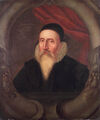Template:Selected anniversaries/July 13: Difference between revisions
No edit summary |
No edit summary |
||
| Line 1: | Line 1: | ||
<gallery> | <gallery> | ||
||100 BC – Julius Caesar, Roman general and statesman (d. 44 BC) | |||
File:John Dee.jpg|link=John Dee (nonfiction)|1527: Mathematician, astronomer, and astrologer [[John Dee (nonfiction)|John Dee]] born. He will achieve high status as a scholar and play a role in Elizabethan politics. | File:John Dee.jpg|link=John Dee (nonfiction)|1527: Mathematician, astronomer, and astrologer [[John Dee (nonfiction)|John Dee]] born. He will achieve high status as a scholar and play a role in Elizabethan politics. | ||
| | ||1527 – John Dee, English-Welsh mathematician, astronomer, and astrologer (d. 1609) | ||
| | ||1762 – James Bradley, English priest and astronomer (b. 1693) | ||
| 1921 – Gabriel Lippmann, Luxembourger physicist and academic, Nobel Prize laureate (b. 1845) | ||1793 – Jean-Paul Marat, French physician and theorist (b. 1743) | ||
||1831 – Arthur Böttcher, German pathologist and anatomist (d. 1889) | |||
||1863 – New York City draft riots: In New York City, opponents of conscription begin three days of rioting which will be later regarded as the worst in United States history. | |||
||1863 – Margaret Murray, British archaeologist, anthropologist, historian, and folklorist (d. 1963) | |||
||Friedrich August Kekulé, later Friedrich August Kekule von Stradonitz (d. 13 July 1896), was a German organic chemist. From the 1850s until his death, Kekulé was one of the most prominent chemists in Europe, especially in theoretical chemistry. He was the principal founder of the theory of chemical structure. | |||
||1919 – The British airship R34 lands in Norfolk, England, completing the first airship return journey across the Atlantic in 182 hours of flight. | |||
|| 1921 – Gabriel Lippmann, Luxembourger physicist and academic, Nobel Prize laureate (b. 1845) | |||
||1934 – Mary E. Byrd, American astronomer and academic (b. 1849) | |||
File:IF-THEN-ELSE-END flowchart.svg.png|link=Artificial intelligence (nonfiction)|1956 – John McCarthy (Dartmouth College), Marvin Minsky (MIT), Claude Shannon (Bell Labs), and Nathaniel Rochester (IBM) assemble the first coordinated research meeting on the topic of "[[Artificial intelligence (nonfiction)|Artificial intelligence]]" at Dartmouth College in Hanover, NH. USA. | |||
||1970 – Leslie Groves, American general and engineer (b. 1896) | |||
File:Skip Digits, Conductor.jpg|link=Skip Digits, Conductor|1972: Signed first edition of ''[[Skip Digits, Conductor]]'' sells for one million dollars; House Democrats say money trail leads to Richard Nixon. | File:Skip Digits, Conductor.jpg|link=Skip Digits, Conductor|1972: Signed first edition of ''[[Skip Digits, Conductor]]'' sells for one million dollars; House Democrats say money trail leads to Richard Nixon. | ||
File:Nixon April-29-1974.jpg|link=Watergate scandal (nonfiction)|1973: [[Watergate scandal (nonfiction)]]: Alexander Butterfield reveals the existence of the "Nixon tapes" to the special Senate committee investigating the [[Watergate scandal (nonfiction)|Watergate break-in]]. | File:Nixon April-29-1974.jpg|link=Watergate scandal (nonfiction)|1973: [[Watergate scandal (nonfiction)]]: Alexander Butterfield reveals the existence of the "Nixon tapes" to the special Senate committee investigating the [[Watergate scandal (nonfiction)|Watergate break-in]]. | ||
||1974 – Patrick Blackett, Baron Blackett, English physicist and academic, Nobel Prize laureate (b. 1897) | |||
File:Hilary Putnam.jpg|link=Hilary Putnam (nonfiction)|1974: Mathematician and crime-fighter [[Hilary Putnam (nonfiction)|Hilary Putnam]] publishes his landmark paper arguing that mathematics is not purely logical, but "quasi-empirical", and that we should beware the possibility of "[[Crimes against mathematical constants|quasi-empirical crimes]]". | File:Hilary Putnam.jpg|link=Hilary Putnam (nonfiction)|1974: Mathematician and crime-fighter [[Hilary Putnam (nonfiction)|Hilary Putnam]] publishes his landmark paper arguing that mathematics is not purely logical, but "quasi-empirical", and that we should beware the possibility of "[[Crimes against mathematical constants|quasi-empirical crimes]]". | ||
||1983 – Gabrielle Roy, Canadian engineer (?) and author (b. 1909) There is a quotation by her on the back of the Canadian $20 bill that reads: "Could we ever know each other in the slightest without the arts?" | |||
</gallery> | </gallery> | ||
Revision as of 08:24, 29 October 2017
1527: Mathematician, astronomer, and astrologer John Dee born. He will achieve high status as a scholar and play a role in Elizabethan politics.
1956 – John McCarthy (Dartmouth College), Marvin Minsky (MIT), Claude Shannon (Bell Labs), and Nathaniel Rochester (IBM) assemble the first coordinated research meeting on the topic of "Artificial intelligence" at Dartmouth College in Hanover, NH. USA.
1972: Signed first edition of Skip Digits, Conductor sells for one million dollars; House Democrats say money trail leads to Richard Nixon.
1973: Watergate scandal (nonfiction): Alexander Butterfield reveals the existence of the "Nixon tapes" to the special Senate committee investigating the Watergate break-in.
1974: Mathematician and crime-fighter Hilary Putnam publishes his landmark paper arguing that mathematics is not purely logical, but "quasi-empirical", and that we should beware the possibility of "quasi-empirical crimes".




